On October 1st, at precisely 11:26 in the morning, I voted “illegally” for the first time in my life. The event in question was a unilateral referendum in which citizens of the Spanish Regional Community of Catalonia were asked: “Do you want Catalonia to become an independent state in the form of a republic?” The referendum was being held by the Catalan regional government in defiance of the Spanish Constitution, a 1978 document negotiated in the tense years following the Franco dictatorship that “is based on the indissoluble unity of the Spanish Nation, the common and indivisible homeland of all Spaniards” (Section 2). A ruling by the Constitutional Tribunal weeks before the referendum declared it illegal, overturning a referendum law hastily passed in the Catalan Parliament days before that based its validity on the right to self-determination enshrined in international law. The real referendum question that emerged, more than “yes” or “no” to Catalan independence, was therefore whether to turn up to vote or not. The question everyone was asking their friends, colleagues and family was “are you going to vote?”, leading many to ask themselves “should I stay or should I go?”
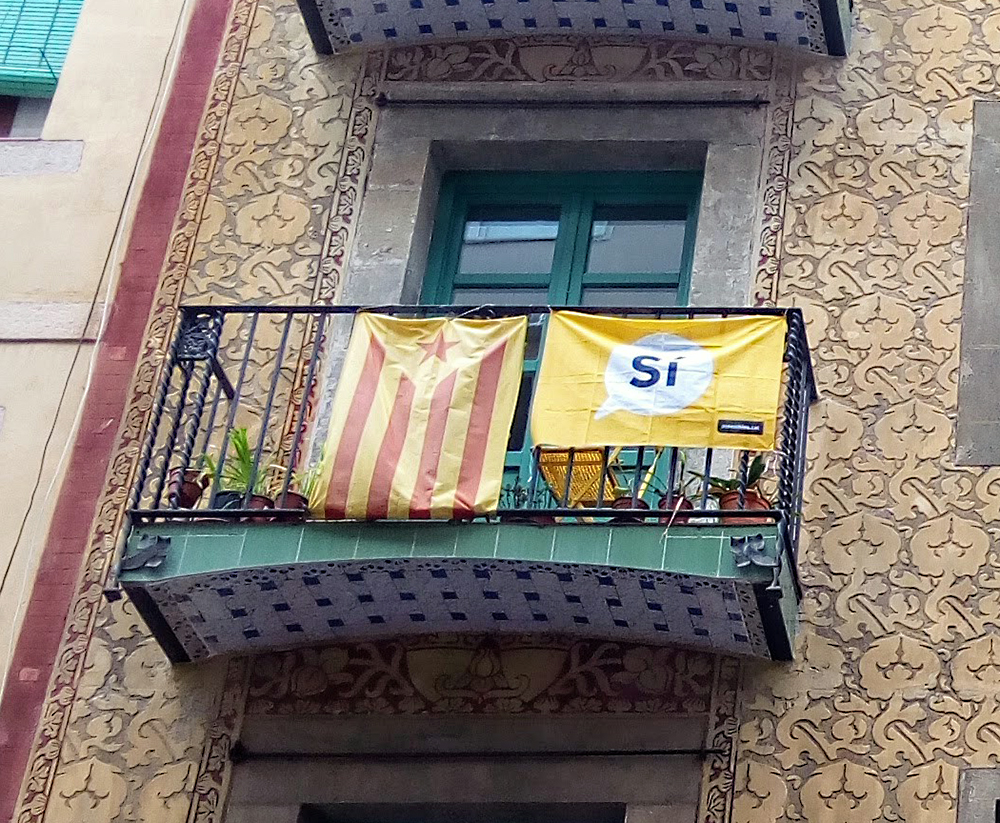
(© 2017 Rafael Gomez-Moriana)
In my mind at least, Joe Strummer’s question proved harder to answer than the one being asked in the illegal referendum. I knew I did not want to vote “yes” because I have never been entirely convinced by the pro-independence arguments. For one thing, Catalonia is not an occupied colony. When the Spanish Constitution was put to a referendum, way back when, the Catalan electorate voted overwhelmingly in its favor. It’s true that Catalonia’s industrial wealth subsidizes Spain’s poorer regions like Andalusia (where I have family), but isn’t that kind of solidarity practiced in most nation-states? In my view, regional independentisme is a largely provincial and small-minded attitude that only creates more borders. I was never in favor of independence for Québec either, when I was growing up there, especially after then-premier Jacques Parizeau blamed the failure of the 1995 referendum on “money and ethnic vote”. A similar statement was more recently made by a Catalan political leader who later became the speaker of the Catalan parlament, Carme Forcadell, when she stated that the only “genuine” Catalans are those who favor independence. Voting “yes” in the Catalan referendum was therefore not an option for me.
But I also couldn’t bring myself to stay home, because that’s exactly what the central PP government (People’s Party) of Mariano Rajoy wanted us to do. This is, after all, the very central government that has fanned the cause of independentisme in Catalonia by using every chance at its disposal to quash Catalan initiatives and aspirations. This entire conflict has been created by the PP in the first place. In 2010, the PP used the Constitutional Tribunal that it effectively controls to bring down a statute on Catalonia’s relationship with Spain that had been previously negotiated with the Socialist central government and had already been approved by both the Catalan and Spanish parliaments as well as by a clear majority of the Catalan electorate in what was then a legal referendum. This political manoeuver by the PP, which had been drumming up anti-Catalan sentiment throughout Spain for years, was understandably the last straw for Catalans, most of whom, according to polls, would prefer to stay in Spain if it recognized Catalonia as a “nation,” enabled Catalonia to collect its own taxes and control its own finances, and was granted greater powers in areas such as education. The recent “illegal” referendum can be seen as a desperate measure that has come about from Catalan frustration with an intransigent, entrenched, and inflexible central government. Instead of convincing Catalans of any benefits associated with remaining in Spain and permitting a legal referendum to go ahead, which polls indicate would likely result in a majority voting “no”, the central government issued threats: law-abiding citizens should stay home or else face the consequences of law enforcement. In such conditions, I couldn’t bring myself to stay home. Besides, the reason the PP government created this conflict in the first place was to distract Spaniards from the many corruption scandals it is mired in. Staying home would have been the easy option. For once, I wouldn’t have to feel bad about being too lazy to vote. But after a week in which the National Police and the Civil Guard arrested most of Catalonia’s mayors for alleged involvement in anti-constitutional activities, along with raids on printing presses in the search for illegal ballots, I became increasingly repulsed by Rajoy.
The only remaining option, in my mind, was therefore to participate in this far-from-perfect referendum and vote “no”, as absurd as this may seem. It would send a message of defiance to both the Catalan and the Spanish leaders, while at the same time effectively constituting a vote in favor of constitutional reform to permit Spanish Regional Communities to hold referendums legally. A legal referendum is, I’m convinced, the only way to settle this issue.
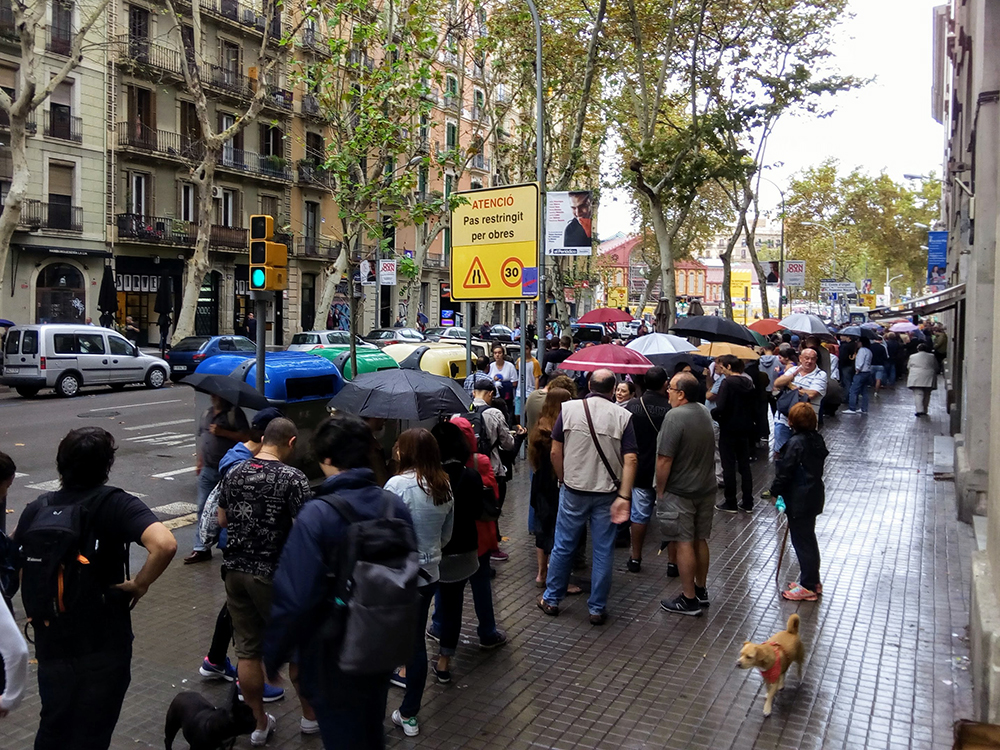
Long lines to vote on referendum day in Barcelona. (© 2017 Rafael Gomez-Moriana)
When “illegal” referendum day finally arrived, I had to wait in a long queue in pouring rain for over an hour before being able, finally, to enter my polling station. Despite the rain, the mood was upbeat, with plenty of friendly conversation with strangers in both Catalan and Castilian. All sorts of rumors were circulating. Apparently, the delays in the voting were due to technical problems with the internet software being used to prevent people from voting more than once, problems that many attributed to mercenary hackers hired by the Spanish government. People were busy texting and talking on the phone to know if any polling stations were being raided, which turned out indeed to be the case.
Finally, the queue —which had gotten much longer— started moving, and a bunch of us were soon inside the Escola Pia school where I had voted legally many times before. Interestingly, many elderly people were coming out to vote, people old enough to have survived the repressive Franco dictatorship, perhaps even the Spanish Civil War, and who appeared determined to exercise what they saw as a right never to be taken for granted. The elderly did not have to wait in line, but were assisted into the polling station by volunteers while everyone cheered them as heroes.
The scene inside the polling station was not very different from other occasions on which I had gone there to vote. Near the entrance, there was a table with stacks of ballots and envelopes, and further inside the foyer a number of tables with ballot boxes staffed by volunteer polling officials. As I approached a table, one of the officials demanded my DNI (Documento Nacional de Identidad, the Spanish state ID card), read the number out loud to someone who typed it into a smartphone application at the same time that someone else entered it manually into a traditional ledger on paper. In no time, the software confirmed that I was a registered voter who hadn’t already voted that day, at which point an official flipped open a lid so I could deposit my ballot. On the way out, those still waiting in line cheered and clapped those of us leaving the station. At a bar across the street where I had gone for coffee, a television set confirmed the rumors in the street: a number of polling stations were indeed being violently raided by national police and civil guard in full riot gear, and many had been brutally beaten.
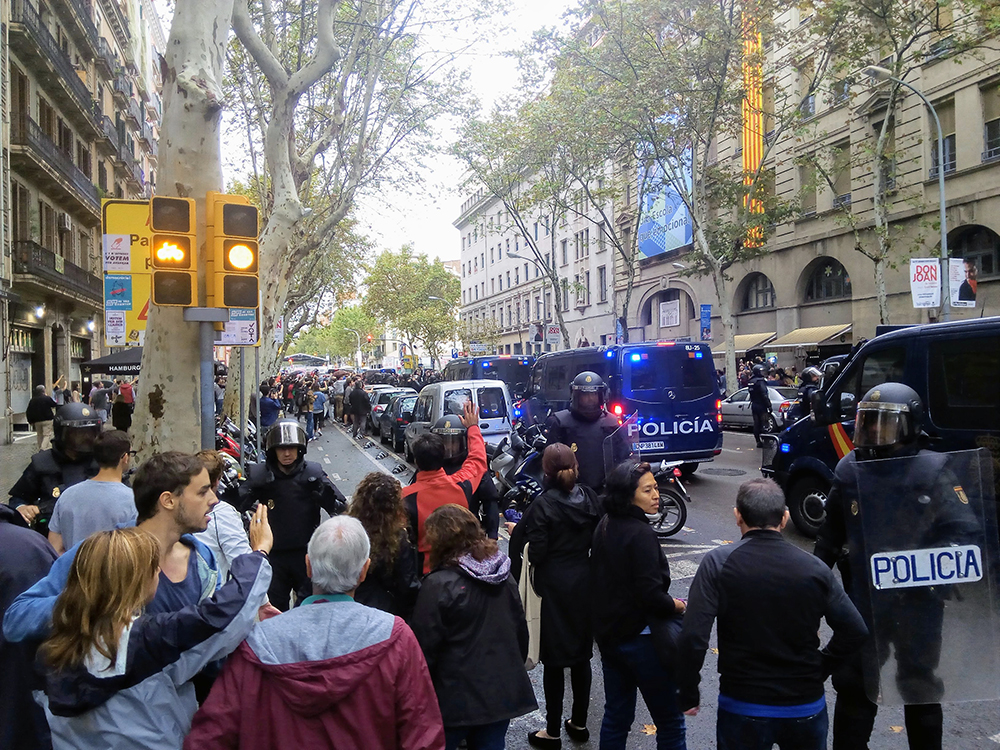
Spanish police were in the streets in force. (© 2017 Rafael Gomez-Moriana)
Upon seeing the disturbing images, I decided to go back to our polling station just in case the police tried to requisition votes. But before I could even cross the street, dozens of national police vans suddenly arrived at high speed and blocked everyone’s path. Cops dressed head to toe in riot gear jumped out of the vans as they came to a stop and immediately formed an impenetrable security barrier. Vans made it impossible to see what was going on in front of the polling station, but I could hear sounds of scuffles. Unable to be of help, I decided to go to another polling station a five-minute walk away, where a crowd was occupying the entire street. Some tourists in an AirBnB apartment with a powerful sound system provided loud music, creating a festive atmosphere in the street. It turned out that this polling station was one of the lucky ones, closing at the end of the day without any incidents. Before the doors were closed to voters, journalists were invited inside to witness the counting of ballots. While this took place, Prime Minister Mariano Rajoy delivered a speech live on television which the tourists broadcast from their balcony to the crowd listening attentively below. When the polling station vote count was completed, doors opened, people were asked to form a protective corridor to some cars parked nearby, and volunteers whisked the ballot boxes away to cheering, singing, and social media uploading.
The referendum may have been illegal (though not necessarily illegitimate), but that was also precisely what made it all the more grassroots, participatory and cathartic for those who participated. It was not your typical polling day: repeated scenes of unarmed peaceful citizens being beaten by riot police with truncheons are not normally associated with voting in Europe. It was precisely the sight of police suppressing “democracy” in a European Union member state that shocked many around the world. Each side spun this differently: For Catalan Premier Carles Puigdemont and the pro-independence movement, attacking voters was an attack on democracy, while for the Spanish authorities democracy —understood as rule of law— was being “defended”.
As the Catalan referendum made evident, it is possible to organize a referendum at a grassroots level, even with police doing everything to sabotage it. But in the end, does the outcome of a voting process fraught with irregularities and difficulties possess enough credibility to be recognized internationally? Conversely, is the violent application of the law against an “illegality” that is non-violent not somewhat disproportionate and arbitrary?
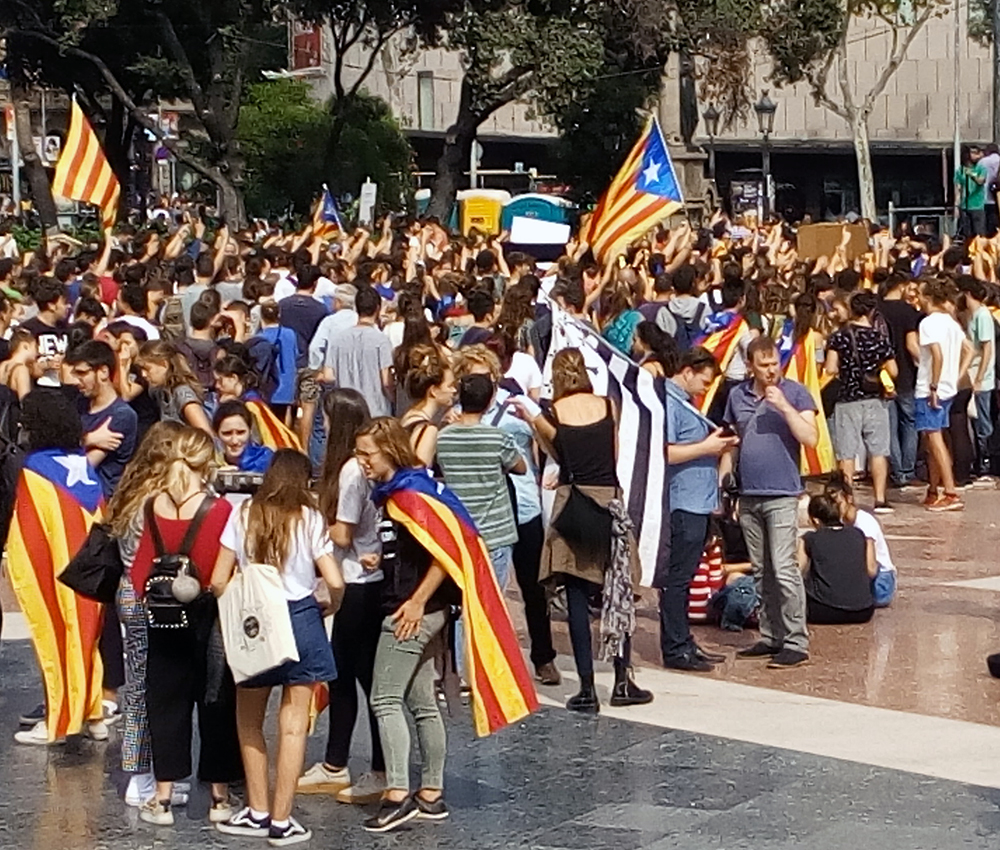
The general strike on the day following the referendum. (© 2017 Rafael Gomez-Moriana)
This conflict is, ultimately, a propaganda war, of course. The holding of this referendum was intended by the Catalan authorities first and foremost to portray an image of popular determination and social cohesion on the question of independence, precisely because in actuality the Catalans are evenly divided on that issue. The only thing most Catalans agree on is the necessity to hold a legal and accorded referendum.
Despite the low turnout of little more than 50%, the referendum achieved what its organizers hoped for: to portray the central government as authoritarian and oppressive. It has to be asked why the Rajoy government would let itself be provoked into what would ostensibly represent an international public relations disaster for them. The police didn’t need to crack down violently at all to prevent Catalan secession, since the Spanish constitution’s article 155, if invoked, permits a region’s autonomy to be suspended by the central government. The police crack-down can therefore only be rationalized in terms of political gains to be made in the rest of Spain. International image matters little to a Rajoy who doesn’t speak English and is largely ignored by other world leaders. Police brutality has also served the pro-independence movement well, increasing its resolve as well as its popular support within Catalonia as well as outside of Spain.
The violent outcome of this “illegal” referendum can thus be seen to have been a boon for both sides of the conflict, a “win-win situation” if ever there was one. The losers in this conflict are those of us who are caught in the middle: non-polarized moderates who demand dialogue and a legal, accorded referendum to settle the conflict. With polarization increasing as this conflict grows more intense, a negotiated resolution only becomes more difficult to achieve at the same time that its necessity becomes greater. It will be interesting to see how this will end, if ever.
***
Rafael Gómez-Moriana is an architect, critic and educator based in Barcelona, Spain, whose research looks mainly at the social and cultural reception of architecture, particularly as conditioned through media and tourism. He is Adjunct Associate Professor at the University of Calgary, locally managing its Barcelona term-abroad program. He has taught at the UPC/CCCB Metropolis Master’s Program in Architecture and Urban Culture, the University of Manitoba, Carleton University, and CIEE Barcelona.

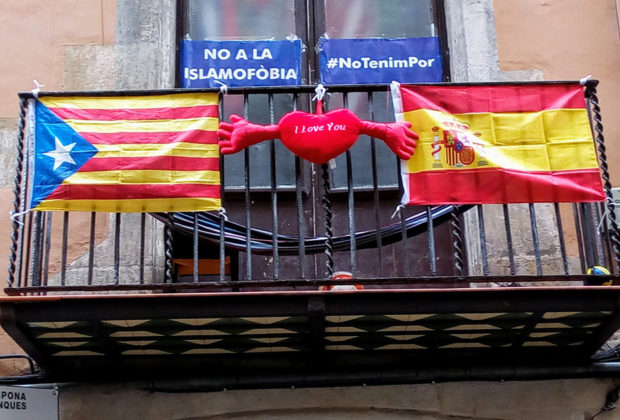





No Comments